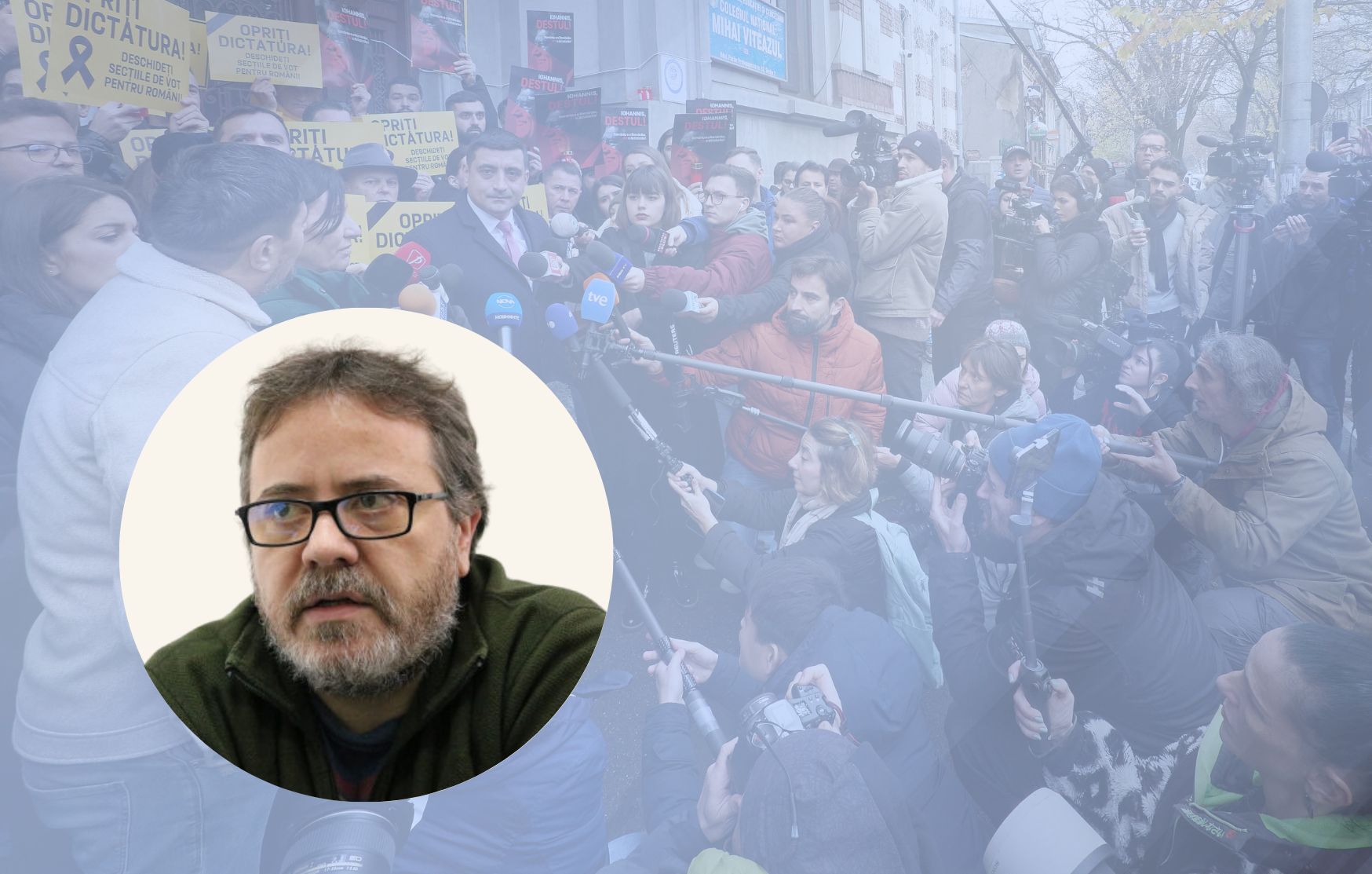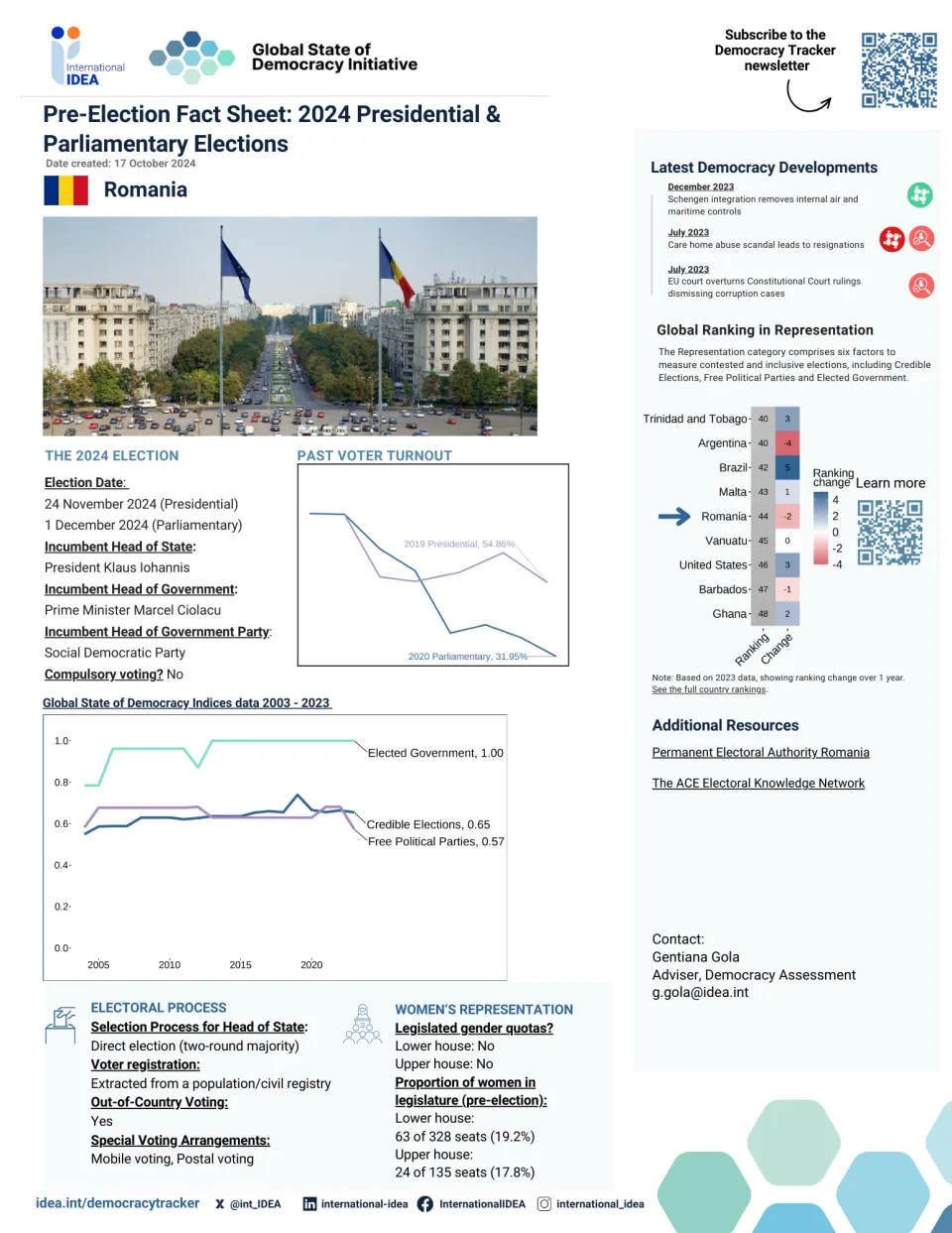
Romania
Romania performs in the mid-range in all categories of the Global State of Democracy framework. While it performs in the top 25 per cent globally in Inclusive Suffrage and Personal Integrity and Security, it also performs in the bottom 25 per cent on Civic Engagement. Between 2019-2024, Romania has advanced in Freedom of Expression, while simultaneously suffering notable declines in Credible Elections, Freedom of the Press, and Economic Equality. Romania is overall converging gradually towards Western European income levels. While Romania historically relied heavily on agriculture, industry, and natural resource extraction, the modern Romanian economy has diversified to include vibrant IT and tourism sectors.
The unification of the principalities of Wallachia and Moldavia in 1862 and the declaration of independence from the Ottoman Empire in 1877 paved the way for the establishment of the state of Romania. After a violent revolution deposed the Communist regime in 1989, the country underwent a difficult transition to democracy, and for years continued to be governed by former Communist officials. Since the fall of Communism, the defining political issue in Romania has been corruption, which has involved high-ranking politicians, weakened the delivery of public services (including in the care sector), triggered protests, and dampened trust in democratic institutions, contributing to persistently low voter turnout. In addition, International IDEA’s 2024 Perceptions of Democracy Survey indicates that Romanians—particularly those with lower incomes—express low levels of faith in the credibility of national elections. Only a quarter of respondents believed the 2020 parliamentary election was free and fair.
Given the country’s large rural population, one of the central cleavages in modern politics concerns the urban-rural divide. Also shaping politics in Romania are high emigration and low birth rates that have fueled a brain drain and an ageing population. Romania is an ethnically, linguistically, and religiously diverse nation. National minorities comprise just over eleven per cent of the population, including large Hungarian and Roma minorities. Parties representing Hungarian interests have considerable influence in government. Over the years, various nationalist political figures have promoted an exclusionary understanding of Romanian identity that heavily emphasizes Romanians’ predominantly Orthodox religious beliefs. The Roma people face institutional and societal discrimination and hate speech, including at the political level.
Although Romania has consistently performed in the mid-range in Gender Equality and provides constitutional protections, resource inequality, including integration in the labour market and in wages, continue to impact women’s income and financial freedom. Gender equality is also challenged by enduring domestic violence, insufficient protection by authorities, and weak political representation of women. Additionally, a recent report ranked Romania in the bottom ten countries in Europe for human rights protections of LGBTQIA+ communities, and European courts have recently found rights violations stemming from insufficient recognition of same-sex relationships and changes to legal gender.
Looking ahead, it will be important to watch the Credible Elections factor in light of the Constitutional Court’s annulment of the 2024 presidential elections, which were re-run in May 2025, including for impacts on public perceptions of the legitimacy of the electoral process and political polarization. Also important to watch will be the government’s performance in the fight against corruption due to a renewed recent focus on this issue, especially proposed legislation criminalizing the bribery of foreign public officials. Attention should also be paid to Social Group Equality in view of recent revelations of severe abuses at care homes affecting the elderly and people with disabilities.
Last updated: June 2025
https://www.idea.int/democracytracker/
December 2025
European court ruling confirms judicial pressure, as documentary sparks protests
On 15 December, the European Court of Human Rights ruled that Romania violated a judge’s freedom of expression by sanctioning him in 2019. The judge was sanctioned for social media posts, commenting on the justice system’s functioning and defending institutional independence, for allegedly ‘impairing the dignity’ of judicial office. The Court upheld the right of judges to express themselves on matters of public interest and stressed the chilling effect of disciplinary sanctions. The judgment coincided with mass protests, with tens of thousands demanding judicial reform, after a Recorder documentary and an open letter by hundreds of judges and prosecutors exposed political control and intimidation in the judiciary. President Nicușor Dan pledged to investigate systemic abuses, held consultations with the judiciary on 22 December and committed to further discussions in January 2026 on reforming the Superior Council of Magistracy (CSM), the body overseeing judicial discipline.
Sources: Reuters (1), Reuters (2), Al Jazeera, Deutsche Welle, Verfassungsblog, European Court of Human Rights, Facebook
July 2025
Constitutional Court upholds amendments expanding hate speech protections
In July, the Constitutional Court upheld the constitutionality of proposed amendments to Emergency Ordinance No. 31/2002 strengthening measures against hate speech. The legislation, adopted by Parliament on 11 June, criminalises the distribution of materials (including images, videos, books and text messages) deemed to have a fascist, racist or xenophobic character, or that deny genocide or war crimes, with penalties of up to five years in prison. Previously, the legislation focused solely on the prohibition of certain symbols and organizations. Additionally, the scope of the legislation is expanded to refer specifically to the 1927-1941 legionary movement which briefly entered government during Ion Antonescu's dictatorship. The Constitutional Court dismissed challenges by opposition MPs and President Nicoșur Dan citing risks to freedom of expression during a preliminary review of the constitutionality of the bill. The rulings are legally binding and clear the way for the legislation’s promulgation.
Sources: Romania Insider, Biziday (1), Biziday (2), Romanian Senate, CCR, Balkan Insight
May 2025
Moderate Bucharest mayor wins presidential election

On 18 May, Nicușor Dan won the second round of Romania’s presidential election with 53.6 per cent of the vote. Dan ran as an independent candidate, and has served as mayor of Bucharest since 2020. George Simion, leader of the Alliance for the Unity of Romanians (AUR) party, received 46.4 per cent of the vote. The Romanian Electoral Authority reported voter turnout of 64.7 per cent, a significant increase from 53.2 per cent in the first round of the election held on 4 May. There were 11 presidential candidates in the first round, including 2 women and 9 men. Observers found the election competitive, but noted the campaign was marred by media bias and insufficient transparency in election administration. Simion challenged the result at the Constitutional Court, claiming electoral fraud and alleging interference by France and Moldova; on 22 May, his appeal was rejected. The election followed the Constitutional Court’s decision to annul the previous presidential election in November 2024.
Sources: International IDEA (1), International IDEA (2), Organization for Security and Co-operation in Europe, Robert Schuman Foundation, Romanian Electoral Authority, Constitutional Court, Radio Free Europe Radio Liberty
February 2025
Presidential election front runner barred from candidacy
On 9 March, the Central Electoral Bureau (BEC) barred Calin Georgescu, who placed first in Romania’s annulled 2024 presidential election, from standing in May’s election re-run due to past violations of electoral law. The Constitutional Court subsequently rejected his appeal. On 15 March, the BEC also disqualified Diana Șoșoacă, SOS Romania party leader, who had already been barred from the 2024 presidential election for “anti-democratic and anti-semitic discourse.” In addition, on 26 February, prosecutors launched criminal proceedings against Georgescu on charges of undermining the Constitutional order, publicly promoting war criminals and fascist organisations, and disseminating false information. The decision sparked violent riots and was rejected by Georgescu and George Simion, the leader of the right-wing nationalist AUR party, claiming it represents an attack on democracy. Several European embassies in Bucharest have underscored the importance of the independence of the Romanian judiciary.
Sources: International IDEA, Reuters, Juridice, Ministerul Public (1), Ministerul Public (2), DW, Romania Insider, Balkan Insight, Biziday
See all event reports for this country
Global ranking per category of democratic performance in 2024
Basic Information
Human Rights Treaties
Performance by category over the last 6 months
Blogs
Election factsheets
Global State of Democracy Indices
Hover over the trend lines to see the exact data points across the years
Factors of Democratic Performance Over Time
Use the slider below to see how democratic performance has changed over time

